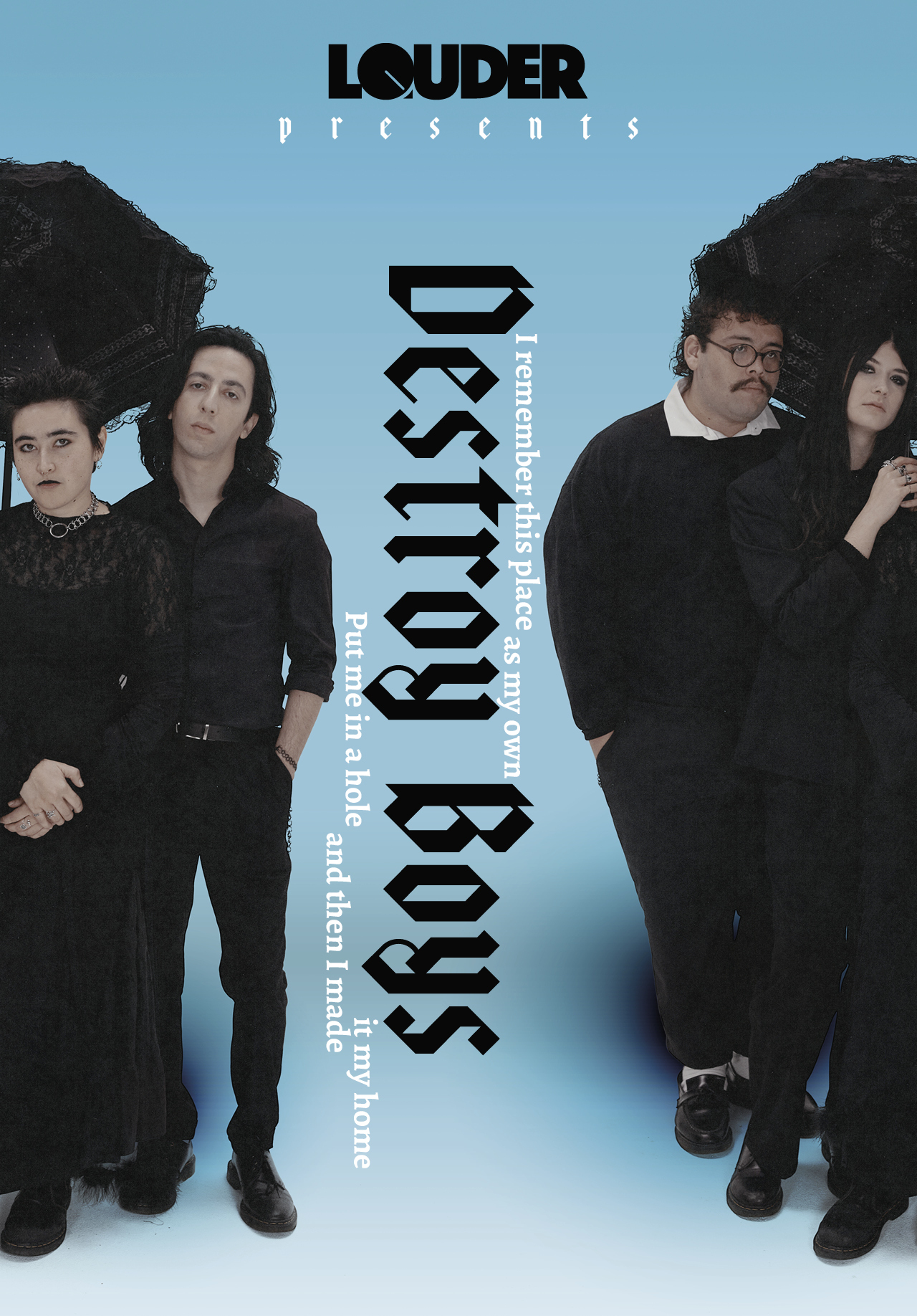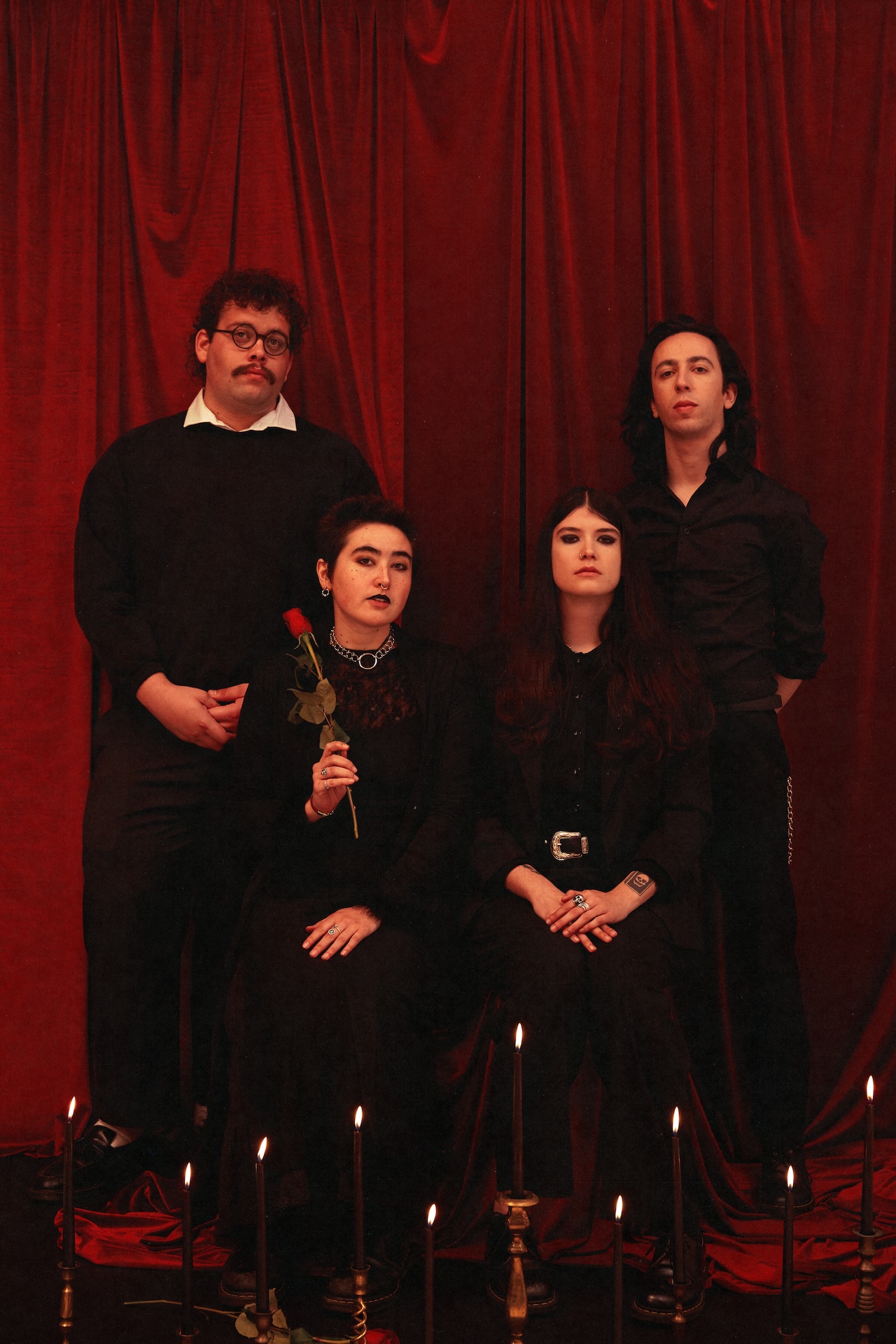
Sat in the van travelling between states on their mini-headline tour of the USA, Destroy Boys’ lead vocalist Alexia Roditis is enjoying life on the road. The four-piece punk band have just played The Harley Davidson festival in Milwaukee, and are making their way to hit the stage at Lollapalooza in Chicago when they join Louder via a slightly creaky video link.
Occasional connection issues aside, the Sacramento-based musician’s enthusiasm and willingness to talk about the band’s fourth record – Funeral Soundtrack #4, just released via Hopeless Records – is palpable. “Going into this record, my perspective shifted to not only think about my needs and wants as a person listening to music, but also our fans, and what they might want to hear," they tell us. “This album felt important to write.”
Originally formed as a duo back in 2015 by Roditis and guitarist Violet Mayugba when they were just 15 years old, Destroy Boys have been busily developing their cathartic punk rock sound over the past nine years. Each of their albums so far – Sorry Mom (2017), Make Room (2018) and Open Mouth, Open Heart (2021) – has documented a period of personal and professional growth for the two musicians. Along with their bandmates, drummer Narsai Malik and bassist David Orozco, Destroy Boys have gone from playing local shows in California, to supporting huge names like Pierce The Veil, Blink-182, Alkaline Trio and Mannequin Pussy in the last two years.

This evolution has culminated in what Roditis and Mayugba believe is Destroy Boys’ best, and most ambitious, album to date. Produced by Carlos de la Garza (Paramore, The Linda Lindas, Best Coast), Funeral Soundtrack #4 documents the band members’ personal journeys – with identity, their sense of who they are and how they fit in with the world – as well as their growth as musicians and a distinct evolution in their sound. The album’s intentions are clearly spelled out, stamped all over the record, from its lyrics to its artwork, where the band’s logo can be seen falling into – or is it emerging from? – a coffin. It’s an energetic eulogy to the band, and the people, they were before. It's a visceral statement of autonomy for the band’s founding members.
For Roiditis in particular, Funeral Soundtrack #4 reflects more openly on their personal journey with gender nonconformity, grapples with issues around identity, and celebrates the punk and queer communities that raised them. This journey started many years ago for Roditis, who is now aged 24. It was their experiences turning up to local punk gigs and witnessing the power of community in action which led to them forming Destroy Boys along with Mayugba in 2015. “My experience [of punk] has been defined by what I see in front of me, which is people taking care of each other most of the time,” Roditis says. “In a mosh pit, if someone falls down, you pick them back up. That’s important. Then if someone was being a dick, someone else would hold them back for a little bit to help them calm down.”
Being a proactive ally is something Roditis truly believes is a force for change, both at gigs and in wider social circles. On Funeral Soundtrack #4, Roditis penned the lyric “Release your fear / I promise you you’re safe here” for the track Shadow (I’m Breaking Down). Initially written as a personal mantra for Roditis during a time of poor mental health, when they were exploring the psychological idea of “The Shadow Self” – the hidden or unprocessed parts of the human psyche – the lyric seems to translate into the pits at Destroy Boys’ shows.
“A lot of people feel like they can be free at our shows,” says Roditis. “They have said that they can dress up in a way that they don’t normally get to express themselves, because if someone starts being a jerk [to them], someone else is going to be there to handle it. Whether that’s security guards or the people that are around them. We try to really emphasise that community protection at our shows.”
Roditis shares that this desire to make a safe space for Destroy Boys’ fans has manifested from their own lived experience of being harassed and feeling unprotected at gigs. Despite their efforts, unfortunately, there are still some shows where members of the crowd behave badly. Roditis doesn’t want this to deter people from speaking up.

“Everybody is autonomous and some people choose to use that autonomy in a horrible way,” they say. “But I think that it’s been really beneficial to remind people that they have a voice and they can use it to defend themselves. I think it’s really important to emphasise that it’s a community space. I feel like sometimes people want to come to the band as the power source, which I totally get, but also, I’m just one person – and y’all down there can do a lot more than I can do in that moment! I hope that that carries into people’s lives outside of the show too. If something is not right, you can do something about it. You can get other people to help you handle it. That’s totally within the realm of your control and that’s awesome.”
This defiant spirit flows freely through Destroy Boys’ new album. While the band’s first three records embody this energy, on Funeral Soundtrack #4, Roditis and their bandmates have truly amped up their anti-establishment ethos. “I think I used to speak about a specific personal issue [in our songs], but now I’m ranging more into wanting to talk about patriarchy, or to talk about love, or I want to talk about the shadow self and broader topics,” they say. “It’s still my experience of them, but I’m just leaving it more open ended than before.” Resilience is another key thread that runs through the record, mostly inspired by Roditis and Mayugba’s natural transition from adolescence into young adulthood as songwriters. Roditis believes that lyrically, the band have matured, whilst musically, their confidence and discipline in playing their instruments has developed, too. In that sense, Funeral Soundtrack #4 feels like Destroy Boys’ most ambitious record yet.
Reflecting on this and their life experiences both on and off stage leads Roditis to “monologue” on how they believe women, AFAB (Assigned Female At Birth) and queer people are socialised to accept and internalise oppressive behaviour, which can lead them to not expressing themselves authentically. Whether that behaviour is from strangers, friends, partners or peers, Roditis is passionate about advocating for self-autonomy and helping each other to address this inequality. “Having the confidence to ask for help is actually very vulnerable,” they comment. “I feel like marginalised people are taught to take the pain they are dealt, when in reality, that’s not fucking fair. I like to remind people that they don’t have to tolerate that. People shouldn’t be doing that to you. If something’s wrong, you don’t have to just sit and take it.”

Combining their community ethos with their desire to branch out and tackle tougher topics on Funeral Soundtrack #4 has manifested in one of the album’s strongest tracks: You Hear Yes. Roditis teamed up with Kat Moss of hardcore punk band Scowl and Mannequin Pussy’s Marisa Dabice to write about their shared experiences of male harassment. Roditis explains that the idea for the track came about because they realised that Destroy Boys didn’t have an explicit anti-patriarchy anthem, despite having a strong “feminist perspective” running through most of their music.
“I really look up to both Marisa and Kat,” Roditis says. “Hardcore is such a masculine and aggressive boy scene – and I love it, don’t get me wrong! But Kat is part of a movement that has carved out a space for her and for so many women and non-binary people to do hardcore music. She also has a great voice. Marisa has such a great voice too. I’ve been following Mannequin Pussy since 2018 and I just love them so much. Both of these bands aren’t afraid to do the right thing. They’re not afraid to get political and I really appreciate that.”
For Roditis, it was important to reflect both the external and the internal effects of patriarchy within the same song. “I wanted it to be broad strokes,” they say. “So for example, the pre-chorus – ‘Why can’t I walk the street without men bothering me?’ – that’s dealing with what happens outside. Then lyrics like – ‘Why does it poison my heart, control stuff from afar?’ – that’s what’s happening inside. Patriarchy isn’t just cat-calling. It’s also the way that men get to control our lives behind closed doors and how much I hate that.” Roditis follows up that last sentiment with a heavily sarcastic “Woo!”, which pacifies the painful truth in that statement. “It’s so horrible that I have to laugh,” they continue, “I’ve learned to regulate my emotions more so that I can make jokes about it, so I don’t cry as much.”
From their gleefully puerile name, to their sardonically titled new album, Destroy Boys know how to have fun. Humour feels like an essential coping mechanism for Roditis and their bandmates. “Our music feels so heavy at times, but as people, we are pretty joyful,” they say. “Everybody in the band, especially the others, can just riff for hours and make jokes.” Joy and humour are powerful tools that can help to dismantle complex emotions, and this is especially true for Roditis in the video for Boyfeel, which was the first single the band shared from their latest record.
Originally written when Roditis was 17 years old, Boyfeel explores their on-going journey with gender nonconformity. Co-directed by Roditis and their friend Tay Allard, the accompanying visuals reflect on the ways in which Roditis chooses to express aspects of their identity and sexuality. From binding their own chest, drawing on facial hair and being playfully tied up in lace by their co-stars, to re-enacting the three-way kissing scene from the movie Challengers, Roditis found the process hugely enjoyable and incredibly liberating. “I haven’t really been able to talk about this actually, and it’s really important to me,” they say. “Everybody who is featured in the Boyfeel video has either done sex work, or is doing sex work. They are all trans, they are all sex workers, and they are all so sexy!
“We had a situation where one of the actors cancelled at the last minute and I was freaking out. I really wanted to have a Latin X trans masc person in the video, because I’m Latin X and I just wanted to reflect these different parts of my identity in the video as well. Getting bound up in all the lace and stuff was also really fun. I kind of entered into sub space when they did that. I just got kind of quiet, but I was really happy and ready to go. We were just having a good ass time, making jokes and coming up with ideas on the fly for what to do.”
Representing the people who supported them throughout their own gender nonconforming journey was important to Roditis. “The community that I have with trans people, gender nonconforming people and queer people is so liberating. I feel like there is a level of understanding where I don’t have to explain anything, they will just say ‘they/them’ and not make a comment about it. It’s so inspiring to see other people expressing themselves in the way that they want to, in a society where we’re told to look a certain way, or you’re garbage. It just punishes us. So I love the feeling that I get when I do that for myself and when I’m around other people who do that. Sex workers are so funny and really kind people. They're sexually free which is so refreshing. I’m a pretty sexually open, kinky person, but that’s not something I talk about a lot. That’s why I like to be around people who can help unchain me.”
Ultimately, as they grow into themselves and become more at ease with the people around them, Roditis feels empowered to motivate others to do the same. “I think that we tend to look at celebrities and politicians and yell at them and expect them to save us, but they’re not doing that,” they say. “But they’re also people who have their own stuff that they’re dealing with. I feel like sometimes we put a lot more power into other people’s hands, rather than holding that power closer to us and the people in our immediate surroundings. You don’t need to give your power away to somebody else.”
Alongside their bandmates in Destroy Boys, Roditis is reclaiming that power and thriving in the process.
Funeral Soundtrack #4 is available now via Hopeless Records, and you can catch Destroy Boys at Reading and Leeds Festival this weekend. Grab an exclusive Destroy Boys T-shirt, with lyrics handwritten by the band, at the Louder store.








